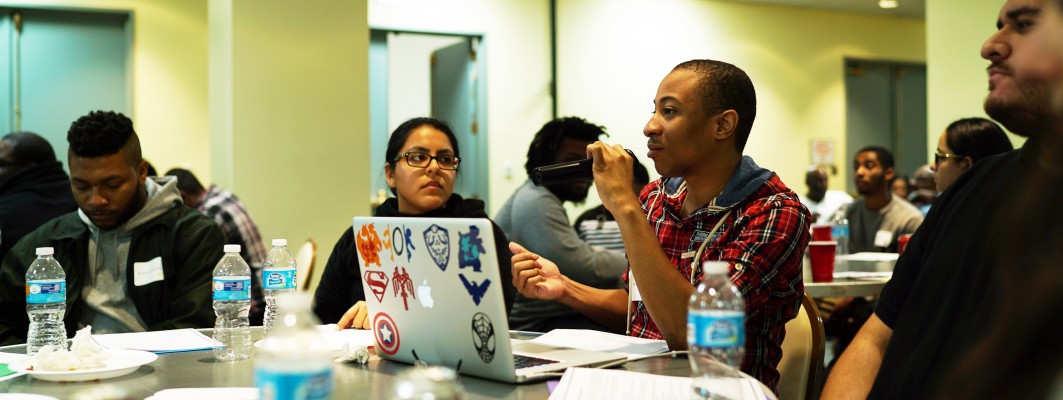
Christine was taking a class to improve her writing skills, having also taken a CPL digital skills class. Christine’s quick comfort with learning is proof that CPL’s approach to adult education — using technology as a gateway to academic skills — is successful with low-skilled adults.
CPL believes Christine’s trajectory is not unusual. Across its 80 branches, CPL is putting an emphasis on reaching adults who lack basic digital literacy skills with their Digital Skills Initiative.
According to Andrea Saenz, CPL’s First Deputy Commissioner, “Basic digital skills are not just something to be done in addition to teaching academic skills.” Instead, she said, “They are the gateway to all kinds of learning.”
CPL wants their branches to be these gateways — gateways to digital skills — a first step along an education and career pathway for adult learners. Being gateways means providing convenient, significant access to technology to a population who typically lacks it.
Through surveys of patrons and its librarians, CPL found that many of the people coming to the library were like Christine: adults struggling to be successful in a digital world. These adults were learners who lacked access to computers or the internet at home, but who needed to get online to look for work and to find resources for their families. Often, these adults also needed help with basic academic skills.
To provide this literacy support, digital and otherwise, CPL knew their approach had to be multifaceted, combining access to technology with a human touch. With this in mind, CPL did more than just provide 3,000 public access computers across its branches.
CPL’s CyberNavigator program trains mentors from the community to be digital skills coaches, helping patrons understand all facets of digital literacy — from turning on the computer and operating a mouse to sending emails and doing internet searches. More than 50 CyberNavigators work across all of CPL’s branches, and CPL has found this program demystifies technology, in turn helping patrons incorporate technology into their daily lives.
Perhaps even more importantly, as was the case with Christine, this exposure to technology is encouraging students to work on their academic skills as well.
Because technology has proven to be this gateway to academics for its learners, CPL knows the quality of the technology it provides learners is critical. After an exhaustive examination of existing digital literacy products, CPL identified three to pilot, but none were right for their needs.
So instead of making do with what they could find, CPL asked the developers behind Digital Learn if they would be open to modifying the existing product. Because CPL offered a large number of beta testers in the way of their learners, the developers agreed.
CPL’s Digital Learn is now offered at all of its branches. CPL trained all CyberNavigators and adult librarians on the system to ensure support for learners wherever they are.
Yet, CPL is not resting on its laurels. They are now demonstrating Digital Learn to other community-based organizations in the Chicago area so even more adult learners can benefit from this platform. They are also developing new modules that their users and CyberNavigators have asked for, including how to recognize online scams and how to shop online.
In addition to their work with Digital Learn, CPL also created a makerspace to give learners hands-on experience with 3-D printers and design programs. Though one might think this kind of technology is for more advanced learners, CPL has seen this is not the case.
“We get learners from all different levels,” said Tommy Stanton, an outreach navigator with CPL’s Maker Lab Program. “A lot of times, adults hear about technology, but they think it isn’t for them. The Maker Lab allows adults to get exposed to tech so they don’t feel left behind.”
As a result of the popularity of this first program, CPL is now designing a second makerspace at a branch undergoing extensive renovation. With the chance to start from scratch, CPL is developing a space and programming that focuses on entrepreneurial and workforce development for both adults and teens.
Mark Andersen, Director of Learning and Economic Advancement, says CPL “wants to test this route in this new makerspace to really enhance job and career prospects.”
As impressive and innovative as CPL’s work with technology and underserved adults is, their work is rooted in a common sense approach to education. They listened to their end users then came up with solutions that meet learners’ needs in ways that suit their strengths as an organization.
And their solutions provide adult learners like Christine the chance to gain the skills that are at the core of learning and working in a digital world.